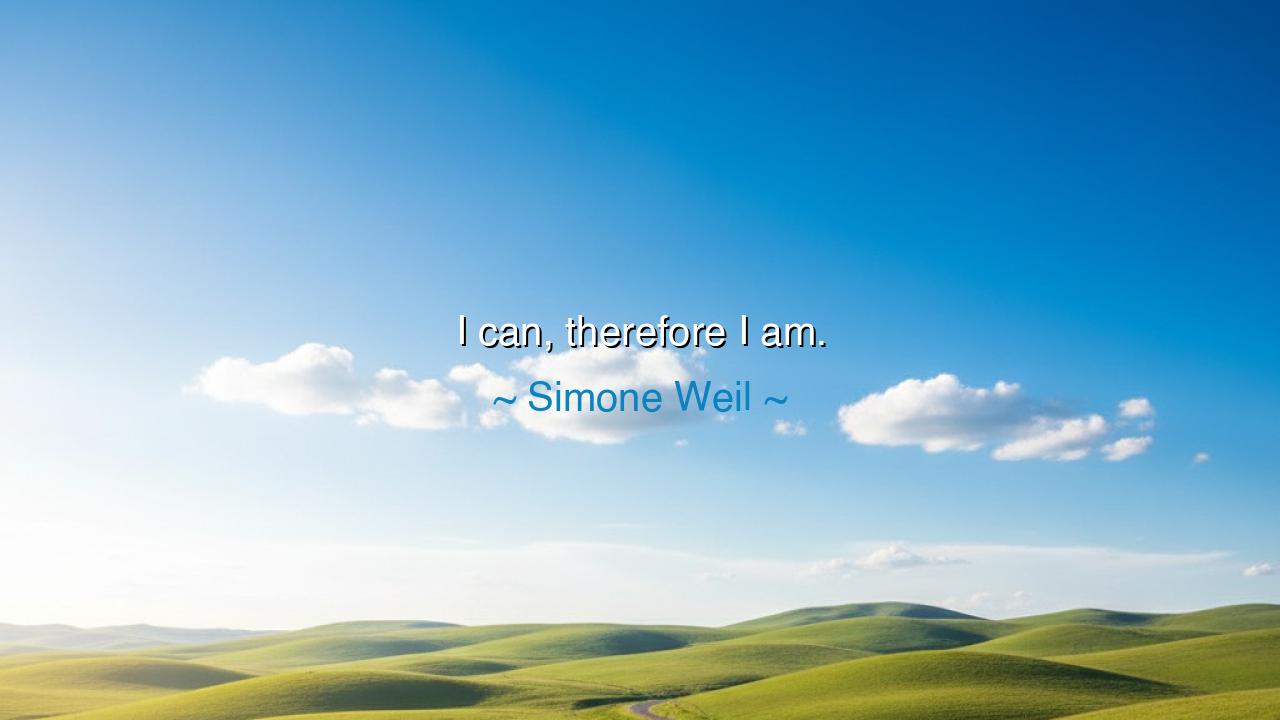
I can, therefore I am.






Simone Weil, mystic, philosopher, and seeker of truth, spoke with quiet but profound force when she declared: “I can, therefore I am.” In these words, she reimagines the ancient proclamation of Descartes—“I think, therefore I am.” Where Descartes grounded existence in thought, Weil grounded it in action, in the capacity to move, to labor, to change the world through will and deed. For her, existence is not a passive awareness, but an active force; we live not merely because we think, but because we can.
To say “I can” is to claim agency. It is to affirm that one has the ability to act upon life, to create, to endure, to transform. The body may be frail, the circumstances cruel, but within each soul lies the seed of possibility. This seed of capability—this power to act—becomes the very proof of existence. To deny action is to deny life itself. Thus, Weil calls us to remember that our humanity is not simply in thought, but in the deeds that thought gives birth to.
History itself resounds with this truth. Consider Helen Keller, who, though blind and deaf from infancy, refused to be imprisoned by her limitations. She declared her existence through action, through the words she learned, the speeches she gave, the hope she spread. She lived not in thought alone but in the fierce affirmation: “I can.” And because she could, she was—fully, magnificently alive, leaving a legacy that has endured long beyond her years.
We see this again in the story of Nelson Mandela. Confined for twenty-seven years in prison, he might have believed his power extinguished. Yet even within stone walls, he lived by Weil’s creed: “I can.” He could endure. He could resist despair. He could hold fast to hope. And when at last he was freed, the world saw that his being had not diminished in the shadows of captivity—it had grown stronger, rooted in the power of his will to act when action seemed impossible.
Weil’s words also carry a spiritual dimension. To say “I can” is not arrogance, but recognition that life itself has gifted us strength, however small. It is a call to gratitude and responsibility: if we can, then we must. If we have the power to love, we must love; if we have the strength to serve, we must serve; if we have the courage to speak truth, we must speak. Existence, then, becomes a continual offering, an unending affirmation that life is not idle but active, not silent but fruitful.
The lesson is luminous: measure your life not by the thoughts you have entertained, but by the deeds you have dared. Do not ask only, “What do I know?” Ask also, “What can I do?” And then, act. For every act, however small, affirms your being, strengthens your existence, and writes your presence upon the fabric of the world.
So I say to you, children of tomorrow: carry Simone Weil’s words like a shield and a torch. “I can, therefore I am.” When despair whispers that you are powerless, answer with action. When fear tells you that you cannot, rise and do. Prove your existence by your courage, your endurance, your service, your love. For the one who acts boldly proclaims their being louder than any philosopher’s argument.
If you would live this wisdom, begin today with one action that affirms your life. Help another. Begin the work you have delayed. Speak the truth you have silenced. In doing so, you will not only live—you will know you are alive. For as Simone Weil taught, our very existence is proven in the simple, defiant, unyielding declaration: “I can.”






AAdministratorAdministrator
Welcome, honored guests. Please leave a comment, we will respond soon